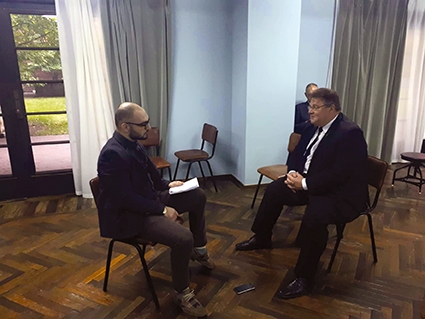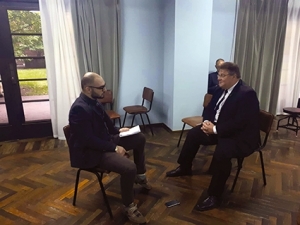Linkevicius on the West - Georgia - Russia Triangle
Exclusive interview
Now What? was the title of the Tbilisi International Conference 2019 and it was the same question that we asked Lithuania's Minister of Foreign Affairs, Linas Linkevicius, in an in-depth interview for GEORGIA TODAY and the Georgian Institute for Security Policy (GiSP) that effectively moonlighted as his vision on the geopolitical conundrum that the Georgian issue came to be between the proverbial West and Russia.
Almost exactly one year ago you published an op-ed in WaPo saying this is a new political season that will prove to be a litmus test for transatlantic unity. One year on, has the West passed this test?
I wouldn't say there’s been great progress but at least it's not collapsed. It’s ongoing and is in fact a stress test for the Euro-Atlantic alliance. We should act with high responsibility from both sides of the ocean, especially considering that sometimes we hear some very discouraging messages from overseas. Let's admit, though, there are some projects in the EU that may also raise questions, like the “European army.” As former Minister of Defense, I can say that neither I nor my colleagues fully understand it, but this is an issue being publicly discussed and raising some tensions and even suspicion overseas. Further, the language used overseas for bashing Europeans is at times too sharp, but we cannot deny the fact that Americans are bearing this burden and that it cannot last forever. Above all, we have to make sure that the Alliance remains as strong as it has been throughout its 70 years of history.
Let's talk about the unwavering support Georgia gets from Eastern Europe when it comes to its Euro-Atlantic aspirations. How much of a gamechanger can that be?
Georgia deserves to be treated better than it is now because this treatment has to be based on the effort made and the performance on the ground. It's important to emphasize that. Georgia’s participation in peace missions is the largest per capita and this is not just theoretical statistics but people dying, being killed, so they’re not just sharing a workload but also taking risks, paying a price. When we talk about future membership, we always focus on the important of seeing alignment with the common policies, be they EU or NATO; we can criticize the country for its domestic affairs and internal conflicts, but the mechanisms are in place and we would like to see Georgia more advanced. At the same time, we should admit that there’s no consensus (in NATO) as yet. Despite that, we are supporting not just the country’s aspirations but its membership, and we’ll try to build this like-minded group as much as possible; it takes time and patience. It was the same with us Lithuanians. Better to improve yourself than point to others’ guilt and so waste time: deepen ties, create implicit security guarantees if not judicial, and become part of this bigger alliance not de jure but de facto. Georgia should be proud of what was achieved, understanding that the ultimate position is not reached so easily but is unavoidable.
The Baltic countries also did their homework and then waited for a window of opportunity. When do you think such a window could open for Georgia?
Nobody knows. For Lithuania, I'm convinced the determining point was 9/11 in New York and Washington because, before that, we were not treated seriously, and our perspective was questioned by many. But when these terrorist attacks took place, it changed the mindset in the United States: first of all, they needed allies, regardless of the size, they needed allies who really shared the risks and who wanted to join this coalition. That was understood consequently in western Europe, which was usually more careful or less enthusiastic [about expansion]. In our case, the turning point was really unexpected. But Georgia has been promised membership, in our case we were not.
Seeing as we have recently witnessed a huge wave of public protests in Russia, would a leadership change in Russia be that kind of window of opportunity for Georgia?
It depends on civic society. We know that sometimes things in Russia change very quickly. I’m not predicting anything- I’m just saying this is historical fact. On the other hand, it’s also true that nobody would do anything from outside; Russia should do it itself. We have no intention and no right to intervene, but our duty is to facilitate the dialogue. That said, waiting for someone [Putin] to go is not a strategy; waiting for anything is not a strategy.
What about strategic patience?
Patience is fine but not if during this time you sit and do nothing; it’s not just waiting for something to change- that’s not smart; we have to cooperate, we have to do our best to keep channels of communication open and trying to sell our case. Also, we need to keep in mind that Russia is not just the Kremlin; Russia is bigger; there are many people also living in [difficult social circumstances]. In Russian civil society there are intellectuals and those who really know what freedom means, what democracy means, and they deserve to be treated as partners and this is the Russia that we have to talk to.
You said before that an appeasement policy towards Russia has never ended well for the West. Do such statements make a difference or do they fall on deaf ears?
Things change, not just because I'm making these statements but also because of national experience. When you’re living in your comfort zone, war is bad, and while the occupation of some countries is also bad, it's not happening to you. But there have been events which really triggered different thinking in many Western European countries, like the Salisbury poisonings, and the downing of that plane, or the presidential elections in France.
Yet Macron had a lovely chat with Putin recently.
But he was very angry about his meddling in the elections. We’ll see how it goes. It is changing, though at a slower pace than many would like.
You’ve repeatedly condemned the borderization. But if you ask the average Georgian what they don’t like about the EU and the West, they would say it’s the ‘all talk, no action.’ When will this change?
Without talk there can be no action. Ideally, there should be consensus and then action can follow; actions so far implemented are the sanctions- economic sanctions for Crimea, sanctions because of the Kerch Strait and chemical attacks, because of the cyber-attacks. You see how it's increasing, and this is the good side; again I would repeat it's not about aggression, it's not an aggressive policy, though Russians always try to present such issues as anti-Russian. They simply should not be allowed to violate international law. It can be very difficult to find the right action. With Georgia, Ukraine, the aggression in Donbass, visiting these places and talking to the people, I find they think the same: “nobody needs us.” It’s very difficult to argue when such fighting is taking place in the middle of Europe. It's very sad but again, what can we do? We must do our best to change the situation, which is what we are going to do regardless of these problems and skepticism and lack of action.
What does the future hold for the Eastern Partnership?
We recently decided to make a differentiation in the program, to recognize that these three association agreement countries are not the same. Now we must give it more substance and give more to those who are able to digest more and to make sure that even if it's not an accession process, it is nevertheless rapprochement with the European Union rather than with the Asian Union. I suggested examples that would be preferable to our partners- projects which are more tangible and visible for people, bringing them closer to the European kitchen, among them energy, the single digital market, connectivity projects, roaming. In line with the visa-free, these would make it really clear to people that something is changing in their everyday lives. I'm not saying that it's so easy to reach out- it takes effort, but if these priorities are made and the differences between the countries recognized…Azerbaijan, Belarus they have different objectives, no missions to join, but they should also feel comfortable in the program; there should be no discrimination. So, if somebody decides to go deeper and wider, then it doesn’t mean that the other side is discriminated against, because that's their choice. The program needs to be attractive to both those who are running fast as well as to those who want something else. This is up to us. By default, it is not a success story yet it has the potential to become so.
By Vazha Tavberidze












